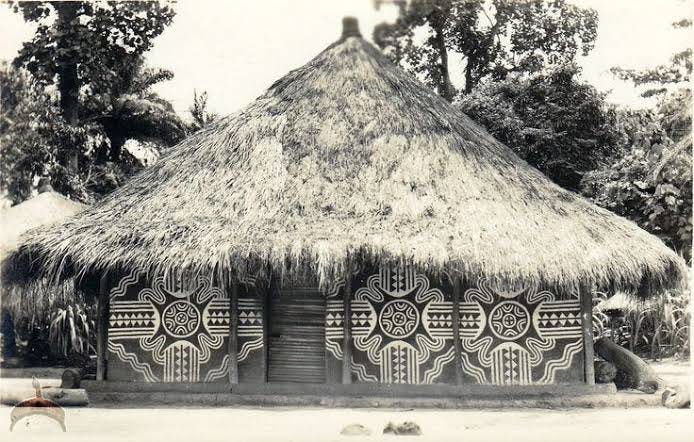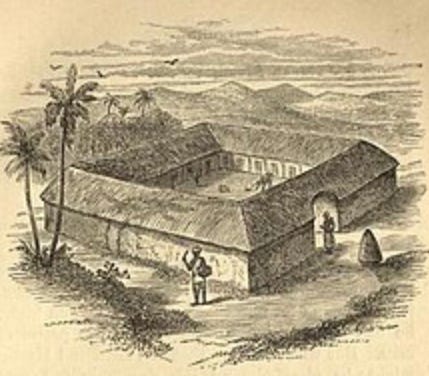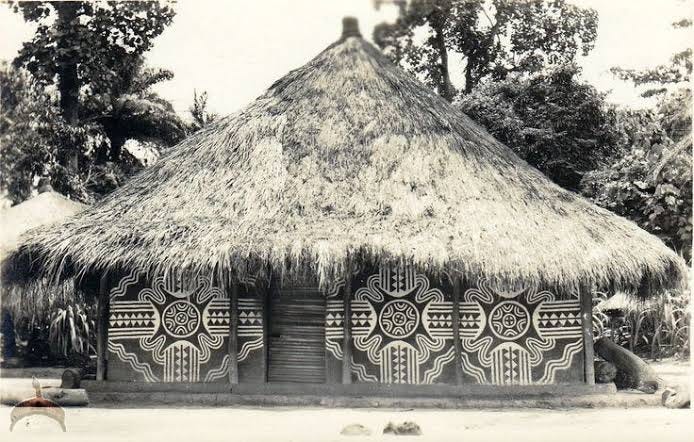Ajiun's power spoke through everything he attached himself to. His harem of wives, carefully handpicked from several villages, well-tilled farms that spread across hectares of land and wooden barns bursting with yams, maize and plantains. However, nothing showed Ajiun’s power better than his dreaded Agboole.
The reddish-brown wall that enclosed his large compound was the first symbol of Ajiun’s wealth and perhaps, arrogance. Where the walls of other chiefs in the village were patchy and uneven like the work of amateur builders, Ajiun’s was smooth and even. The clay was carefully plastered and baked to perfection by the sun. His walls were intricately designed with yellow and black wavy lines running across and black circles carefully painted into each curve. Carved within the walls were lines that seemed abstract at first but on closer look, rearranged themselves into forms of Ogun, Yemoja, calabashes and strings of cowries.
Some people say his labourers spent months under the blazing sun in the thick of the harvest season working on these carvings because each time there was even the slightest mistake even in the smallest cowrie, Ajuin sent for more clay to cover it up and work began afresh.
One may have mistaken his walls for palace walls except his lacked the carving of the Kabiyesi’s royal irukere. Some say Ajiun wanted to add it but the gods threatened to strike him down and so he carved a full horse into his wall instead but made sure the tail was as life-like as possible. So, each time anyone saw the horse, the tail was really the only thing they saw. In that act, his arrogance showed.
The wide entrance into Ajiun’s Agboole had no gate or guards. It was left completely open and unmanned and visitors visiting the village for the first time thought it inviting but all the villagers knew it was almost an open trap.
I placed a foot over the imaginary line that separated his compound from the path I stood on and crossed the threshold. I sucked in my breath. I had seen glimpses of what the inside of his compound looked like but they did no justice to how it really looked. The huts spread wide apart reminded me of my father’s agboole except the huts were much bigger and the thatch roofs were fresh, plump, fat and full. It was not hard to imagine the coolness of the huts.
At the market, his wives confidently walk through the stalls with their shoulders held high in the air as they loudly proclaimed that Ajiun replaced their thatch roofs every year. I would watch as the market women’s eyes widened in wonder and hearts silently wished they had caught his eye too instead of the lesser men they were destined for. Not even the Kabiyesi changed the roofs of his wives’ huts that often. As they strolled, each seller would call to convince them to buy their wares because they knew the wives of Ajiun never haggled.
He strictly forbade it. Haggling was for paupers.
The smell of Egusi soup and bush meat suddenly filled my nose. I saw Ajiun’s wife, Awero, bent over a pot of soup in a large square with low walls that served as a kitchen area. She used cassava leaves to protect her hands as she hurriedly brought down the hot pot but they must have still scalded her fingers because she quickly immersed them in a calabash of water.
With her hands still soaking and eyes shut, she lowered herself to a small apoti and sat. Her face began to go back from tomato red to its original colour.
Awero’s skin was quite different from ours in so many ways. Her skin colour was like the surface layer of congealed palm oil, her long curly hair got stares from all the ladies at the onidiri’s stall and her eye colour was the reason she was banished from her village. No one knew who her father was but these features alluded to the fact that she was fathered by no son of Oduduwa. Awero was a bastard.
Awero withdrew her small hands from the water and started to wet the glowing red firewood. She stopped when she saw my feet from where she was working. She stood to her full height and used the back of her hands to shift her long braids from the front of her face. Her full dark green eyes glinted, her cheeks raised into rosy balls and her lips spread to show off slightly yellowing teeth. She raised her hand to wave at me, animatedly. I raised my eyebrows in acknowledgement.
“Is it until the rains descend that you will finish up?”
Awero turned and Iya Akanji came into full view. Iya Akanji was built in contrast to Awero. While Awero was plump and full of life, Iya Akanji’s bony frame looked like life was pumped out of her every day. Her skin was dry, her cheeks, sunken and her expensive adire hung off her bones like a scarecrow.
Iya Akanji hissed and Awero promptly bent and went back to wetting the firewood and cleaning the cooking area. Iya Akanji’s face turned to me regarding me with the disgust one had for esha tomatoes until she hissed and walked into her hut, slamming the perfectly polished wooden gate.
“Iya Akanji can smell fresh meat”, I heard a voice rumble with laughter. “And that’s why she still behaves like a new wife”.
I turned and saw Ajiun leaning slightly against a pillar that was expertly carved with snakes running around it. He rested both hands on an obsidian staff that carried the head of a lion and along the body of the staff were incisions that some swore had spiritual powers. The rings on his fingers glinted in the sun and the teal agbada he wore was embroidered with glimmering black wool which complimented his silver fila. He heaved a little - not from fatigue but a heightened sense of self-importance - as he swung his staff majestically and made his way towards me.
“Iya Akanji is the most jealous of my wives. So do not listen to anything she says”.
I summoned a small smile and curtsied, “You asked me to come”, I said softly.
“Call me husband”, Ajiun took my hand and led me to a bench where he sat.
“Sit”, he commanded. But Iya agba had taught me too well. I knelt and I saw a smile of approval appear on his face. I can almost see my father bursting with happiness at how subservient his daughter was.
From the corner of my eyes, I saw a pale man with the sharp like nose of an igi-igi walk out of Ajiun’s compound with a small woman dressed in a torn wrapper trailing after him. I had heard that large bunches of plantains were not the only trade Ajiun engaged in but no one except his wives knew what he did. And they never spoke of it.
“When do I com..”, Ajiun started but a rotund woman came to stand beside him with her arms akimbo and her shoulders almost reaching her ears. I could feel her stare burn into me as she tapped her foot which had garishly long toenails.
“Your food is ready, my husband”, she announced, stressing on the ‘my husband’ bit.
“And can’t you see that I am busy, Iya Pelumi?”, Ajiun retorted and spun to look towards Iya Akanji’s hut. Just as he turned, Iya Akanji’s curious face withdrew into the shadows of her hut.
“Don’t you people know I am busy?!”, Ajiun thundered and Iya Pelumi’s ego quickly deflated as though it was never even there. Her hand left her thick waist as her eyes darted about, trying to find an excuse.
“Ehn.., My Lord… I know you have not eaten… That’s wh...”
Ajuin stood up angrily and grabbed my hand, roughly pulling me from where I knelt towards his hut. As we walked, I could hear Iya Pelumi’s legs shuffling away, probably to report back to Iya Akanji. We reached a large hut that was so obviously Ajiun’s. The roof rose high into the sky, competing with the trees and the intricate designs around the hut left my mouth open in wonder.
As he was about to pull me inside, I regained my composure and squeezed his hand tight. His stare burned into me as though wondering why I was questioning his decision. I licked my lips and looked down, feigning timidity. “I thought we would go to your farm”.
It took a while for him to get it but when he did, the anger, so visibly written on his face, dissolved into a look of curiosity and satisfaction.
“I knew you were a wild one”, his hand relaxed and he gently held my palm to his face.
“Meet me on my farm when the night covers the day.” And with that, he turned and walked into his hut.
I had achieved what I came for but as I made for the exit, I glanced at the kitchen area which was now spotlessly clean with new firewood arranged for the next person. My eyes spotted the box of matches carefully laid next to the fireplace and I looked around cautiously before approaching. Inside the kitchen, I carefully went around the gourds of water and carefully stacked pots towards the matchbox.
“Are you now trying to poison our food?”
My hands closed around the matchbox tightly and I turned to face Iya Akanji
“I was parched and looking to get some water”. I raised a calabash of water and Iya Akanji snatched it, deliberately splashing some all over my chest.
“I know the game you are playing. You will not have him. Others have tried and failed. And the stupid cowries you put in your hair will not help you.”, Iya Ajiun spoke menacingly through her teeth.
“If you don’t let her go, I will throw you out of this house!”, Ajiun shouted from outside his hut and Iya Akanji slowly shifted to the side, making way for me.
As I relaxed the fist holding the matchbox, I felt the sweat that formed in my palms soaking through the box and I silently hoped they would not be too wet to light a fire under the body of Iya Akanji’s husband tonight.
Hey guys, to follow my Esu series, click here to subscribe to my newsletter!
Agboole - Household.
Ogun - The Yoruba god of Iron.
Yemoja - The Yoruba goddess of the sea.
Irukere - A symbol of authority usually carried by kings of Yorubaland. It is made from the tail of a horse.
Apoti - Stool.
Onidiri - Hairdresser.
Adire - an indigo-dyed cloth made in southwestern Nigeria by Yoruba women.
Esha - Partially rotten tomatoes usually bought by the poor or less-privileged.
Igi-igi - Woodpecker.








Love how detailed the story is❤️❤️❤️
She didn't have to kill him too. Ahh